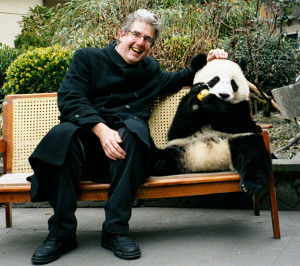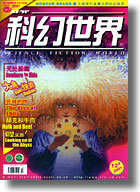Follow Scott
Recent Tweets
- Waiting for Twitter... Once Twitter is ready they will display my Tweets again.
Latest Photos
Search
Tags
anniversary Balticon birthdays Bryan Voltaggio Capclave comics Cons context-free comic book panel conventions DC Comics dreams Eating the Fantastic food garden horror Irene Vartanoff Len Wein Man v. Food Marie Severin Marvel Comics My Father my writing Nebula Awards Next restaurant obituaries old magazines Paris Review Readercon rejection slips San Diego Comic-Con Scarecrow science fiction Science Fiction Age Sharon Moody Stan Lee Stoker Awards StokerCon Superman ukulele Video Why Not Say What Happened Worldcon World Fantasy Convention World Horror Convention zombies
©2025 Scott Edelman
Rescuing a panda from Chengdu
Posted by: Scott
Tags:
Science Fiction Weekly
Posted date:
April 5, 2015 |
No comment
I arrived home from my Copenhagen birthday celebration early yesterday morning to find several people had been talking about me and a panda. That’s because Ellen Datlow, Eileen Gunn, and several others are heading to China, and as part of the trip will travel to Chengdu to visit with Chinese science fictions writers and editors, something I did back in 2001.
But I didn’t just meet with writers and editors—I met with a panda as well, and even though it’s said that what gets onto the Internet lives there forever, the photo of me from that day seems to have vanished. Well, thanks to the Wayback Machine, it’s back.
That photo original appeared in issue 242 of Science Fiction Weekly, as part of my December 10, 2001 editorial. And since others have asked to see it, you’re going to see it, too.
So let’s step back 13+ years, and relive my trip to China …
It Really Is a Small World After All
Rudyard Kipling once wrote, “Oh, East is East, and West is West, and never the twain shall meet,” but Kipling was contradicted last week when East and West did get a chance to meet. This get-together occurred in the city of Chengdu in the People’s Republic of China, where I visited for nine days with the warm and welcoming staff of Science Fiction World, the 370,000 monthly circulation of which just happens to make it the most-read SF magazine on the planet.
This was my first visit to China, though there had been other chances to do so over the past decade. My hosts had held many science-fiction conventions before in Chengdu, the capital city of the Sichuan Province. These conventions always drew tens of thousands of local fans and a handful of American writers and editors. Though I wanted to attend these events, my personal circumstances at the time always seemed to conspire against it. So the day before Thanksgiving, even without the impetus of an official conference, I flew to the other side of the world for a more intimate gathering. With the help of my trusty translators, Tang Feng and Liu Xiaoyan—each of whom worked magic to make sure I sounded more intelligent to the Chinese than I actually am—I was able to hold many discussions about SF with the magazine’s large staff.
There were differences between us, yes, but there was far more to be found in common. As magazine editors, we were all worried about increasing our readerships, and gave each other advice as to what worked in our respective countries. As readers, we had similar tastes—one of their favorite American SF novels, which was well received by the Chinese audience when published there in translation, was Jem, by Frederik Pohl. The Matrix was as loved by Chinese teen-agers as by their American counterparts. And I was shown that, as writers, their native SF can be as prescient as our own, as was shown by a story recently reprinted in Science Fiction World from one of their earliest issues. Mr. Tan Kai’s “The Kiss of Eblis” dealt with an anthrax scare two decades ago, and in light of current events, a decision was made to introduce the story to a new audience. We sat, both in the company’s spacious offices and over dumplings and green tea in tea houses, and talked of ways to improve the bonds between the American and Chinese SF communities.
But it wasn’t all work. In between these discussions of SF, my hosts left time for other things as well, as can be seen by the photo above. We visited the Giant Panda Preserve at Wolong City, where I was stunned to be allowed to sit beside one on a park bench as it gnawed an apple. We visited the famous thatched cottage of the poet and national hero Du Fu, and visited the archaeological site of Sanxingdui, where ancient, eerie masks that seemed akin to space helmets of alien visitors were enough to inspire SF stories of their own.
Fans are fans, whatever the nation
I also had a chance to meet with the Chinese SF fans, some of whom will constitute the next generation of writers and editors. I was given the opportunity to speak about American SF at a middle school, at an aeronautical high school, and to the local SF fan club at Sichuan University. After my pontificating, which gave my translators quite a challenge, these fans barraged me with questions, many of them asked in flawless English, making my struggles with Mandarin Chinese appear even more pitiful. (The two phrases I worked at the hardest were Chinese for “I don’t understand” and “I’m sorry,” because it seemed important for a bumbling American to know how to smooth things over. However, often even my “I don’t understand” could not be understood.)
Their concerns proved remarkably to be not that much different from those of American fans. The younger fans wanted to know whether I believed time travel to be possible, whether I felt there was actually life on other planets and if I liked the X-Men film. The older fans, however, seemed to have a more detailed knowledge of American SF, and it showed in their questions.
One fan wanted to know my opinion of the recent Hugo win by Harry Potter, an event which has inspired heated comment in our letter column here ever since the Philadelphia WorldCon. It turns out to be as controversial among Chinese SF fans as it was among Americans. But another question showed that even with the Internet shrinking our world, some news travels slowly. On two different occasions, fans expressed concern over the health of Poul Anderson, and asked how he was doing, and it was my sad duty to inform them that this giant was no longer with us. So the Web has not demolished all boundaries of time and space. But hopefully this visit helped knock down a few more of those walls.
Halfway around the world, I discovered that SF fans, writers and readers are not that much different, whatever their language or continent. Will you forgive me if I tell you that a few times during the week I found myself turning over in my mind the often-mocked Disney anthem “It’s a Small World After All”? The sentiment seemed appropriate. And it also seemed appropriate to me that it was science fiction, which has guided my life almost from the moment of birth, that was helping to make it even smaller.


